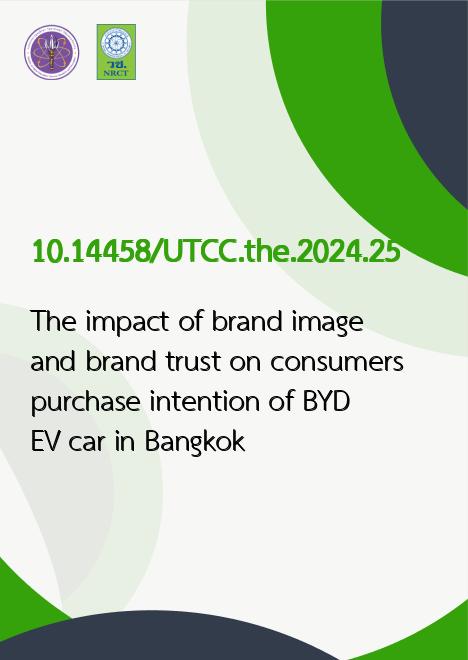
|
The impact of brand image and brand trust on consumers purchase intention of BYD EV car in Bangkok |
|---|---|
| รหัสดีโอไอ | |
| Title | The impact of brand image and brand trust on consumers purchase intention of BYD EV car in Bangkok |
| Creator | Jingyao, Xu |
| Publisher | University of the Thai Chamber of Commerce (UTCC) |
| Publication Year | 2567 |
| Keyword | Consumer behavior -- Bangkok, Electric vehicles, Branding (Marketing) -- Psychological aspects, Consumers -- Attitudes |
| Abstract | This study investigates the influence of brand image and brand trust on consumers' intention to purchase BYD EV cars in Bangkok, Thailand. In this study, brand image was divided into three dimensions, namely corporate image, product/service image and user image, with reference to the Biel model, in order to understand how these factors affect the decision-making process of consumers' purchase intention for BYD EV cars. The research data was collected using a single structured questionnaire, and 289 valid questionnaires were obtained. Through descriptive data analysis of demographic characteristics and frequency distribution, it is known that the main respondents are male (55.6%), of which 48.4% are aged between 30-39, indicating that relatively young consumers have a high acceptance of new energy vehicles. The majority of respondents had a Bachelor's degree or higher, indicating that most of the sample was highly educated. Income levels vary. Cronbach's alpha coefficient was used for reliability analysis and the reliability scores for each dimension were high, indicating internal consistency and within the acceptable research range. Validity analysis ensures that the measured results accurately reflect the structure of interest. Sampling adequacy was verified by KMO measurements, and the Bartlett sphericity test significantly confirmed that the data were suitable for analysis. Correlation analysis is used to check whether there is a significant positive correlation between the independent variables (company image, product/service image, user image, brand trust) and the dependent variable (purchase intention). Meanwhile, multiple regression analysis was used to further determine the relative contribution of the predictors to purchase intention. It is found that the three dimensions of brand image have a impact on consumers' purchase intention, and the impact of product/service image on consumers' purchase intention is much higher than that of company image and user image. Brand trust also has a significant positive effect on consumers' purchase intention, but the effect is still lower than that of product/service image in the three dimensions of brand image. At the same time, the explanatory power of these factors for purchase intention is 43.8%, and there are other factors that are not mentioned. The research results have practical significance for BYD and new energy automobile enterprises. For example, BYD and other new energy automobile manufacturers should strengthen their corporate image, emphasize their brand awareness and industry status in this field, establish a good corporate image, and enhance consumer confidence. Maintain high quality products while focusing on service quality and enterprise research and development capabilities. Build strong brand trust through reliable products and outstanding services to enhance consumer confidence and purchase intentions. This study highlights the importance of good brand image and brand trust in shaping the purchase intention of consumers with new entry technology "EV Car". The results show that marketing strategies that pay attention to these factors can help increase sales. Future research could further explore other factors that influence purchase intentions |
| URL Website | https://scholar.utcc.ac.th |
| Website title | UTCC Scholar |
